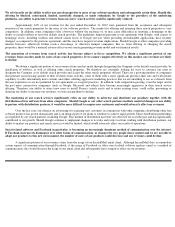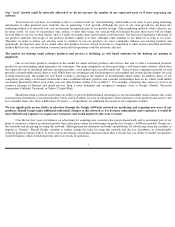Incredimail 2012 Annual Report Download - page 19
Download and view the complete annual report
Please find page 19 of the 2012 Incredimail annual report below. You can navigate through the pages in the report by either clicking on the pages listed below, or by using the keyword search tool below to find specific information within the annual report.
Additionally, there is a significant possibility that the U.S. Congress may enact laws regulating the tracking of the Internet activity of
individuals, even if no personally identifiable information is being collected. Currently, the Internet industry has been attempting to self-
regulate
in this area. However, to date, the industry has not developed a “do-not-track” standard. If "do-not-
track" legislation is enacted, this could impact
our ability to design a highly effective targeted advertising campaign, which could result in lower revenues derived from advertising.
The FTC recently published a Staff Report which proposes guidelines on privacy disclosures for entities in the mobile marketplace.
Although the guidelines are not binding, they highlight privacy practices upon which the FTC places great importance. Considering the FTC’
s
increased focus on privacy in mobile application, its recent enforcement actions, and its ongoing efforts to protect the privacy and personal
information of mobile users, entities operating in the mobile marketplace may be impacted by future regulation in this area. We offer products
with mobile capabilities which could be affected depending upon the scope of such legislation.
In addition, technology is changing constantly and data security regulations and standards are in a state of flux. Changes in law or
regulations may require that we materially change the way we do business. For example, we may be required to implement physical,
administrative and technological security measures different from those we have now, such as different data access controls or encryption
technology. We use cloud based servers. Cloud computing is not without substantial risk, particularly at a time when businesses of almost every
kind are finding themselves subject to an ever expanding range of state and federal data security and privacy laws, document retention
requirements, and other standards of accountability. We may incur substantial expenses in implementing such security measures.
Although decisions of the U.S. Supreme Court restrict the imposition of obligations to collect state and local sales and use taxes with
respect to sales made over the Internet, the U.S. Congress and a number of states have been considering or have adopted various initiatives that
could limit or supersede these decisions. Some states have aggressively interpreted the necessary nexus required to impose sales taxes to include
activities that were not previously taxable. If any of these initiatives results in a reversal of the current law or practice in this regard, we could be
required to collect sales and use taxes on our U.S. sales. The imposition by state and local governments of various taxes upon Internet commerce
could create administrative burdens for us and could decrease our future sales.
The European Union has already enacted legislation regarding Value Added Tax imposed on certain software sold by companies
outside the European Union to consumers in the European Union over the Internet. This legislation could be interpreted to include certain parts
of our business not yet accrued for by us causing additional significant tax exposure, or alternatively, reduce the competitiveness of the pricing
of our products.
The cost of compliance with worldwide taxation, consumer data protection and privacy related laws and regulations could be material
and we may not be able to comply with the applicable regulations in a timely or cost-
effective manner. In response to evolving legal
requirements, we may be compelled to change our business model and practices, which could reduce our sales, and we may not be able to
replace the revenues lost as a consequence of the change. These changes could also require us to incur significant expenses, subject us to liability
and require increased time and attention of our management. See "Item 4.B Business Overview —
Government Regulation" for additional
discussion of applicable regulations affecting our business.
Risks Related to Our Operations in Israel
Political, economic and military instability in the Middle East may impede our ability to operate and harm our financial results.
Our principal executive offices are located in Israel. Accordingly, political, economic and military conditions in the Middle East may
affect our business directly. Since the establishment of the State of Israel in 1948, a number of armed conflicts have occurred between Israel and
its Arab neighbors. Since the end of 2011, several countries in the region, including Egypt and Syria, have been experiencing civil unrest,
political turbulence and violence which are affecting the political stability of those countries. This instability may lead to deterioration of the
political and economic relationships that exist between the State of Israel and some of these countries. In addition, Iran has threatened to attack
Israel and is widely believed to be developing nuclear weapons. Iran is also believed to have a strong influence among extremist groups in the
region, such as Hamas in Gaza and Hezbollah in Lebanon. These situations may potentially escalate in the future to more violent events which
may affect Israel and us. These situations, including conflicts which involved missile strikes against civilian targets in various parts of Israel,
negatively affected business conditions in Israel. Any hostilities involving Israel or the interruption or curtailment of trade between Israel and its
present trading partners could have a material adverse effect on our business, operating results and financial condition. While such hostilities did
not in the past have a material adverse impact on our business, we cannot guarantee that hostilities will not be renewed and have such an effect in
the future. Ongoing and revived hostilities and the attempts to resolve the conflict between Israel and its Arab neighbors often results in political
instability that affects the Israeli capital markets and can cause volatility in interest rates, exchange rates and stock market quotes. The political
and security situation in Israel may result in parties with whom we have contracts claiming that they are not obligated to perform their
commitments under those agreements pursuant to force majeure provisions. These or other Israeli political or economic factors could harm our
operations and product development and cause our sales to decrease. Any hostilities involving Israel or the interruption or curtailment of trade
between Israel and its present trading partners could adversely affect our operations and could make it more difficult for us to raise capital.
Furthermore, several countries, principally those in the Middle East, still restrict business with Israel and Israeli companies and, although the
impact of these restrictions is not as important for a company such as ours that sells its products through the Internet, it may nevertheless have an
adverse effect on our results of operations. Since many of our facilities are located in Israel, we could experience serious disruptions if acts
associated with this conflict result in any serious damage to our facilities. Our business interruption insurance may not adequately compensate us
for losses that may occur and any losses or damages incurred by us could have a material adverse effect on our business. Any future armed
conflicts or political instability in the region would likely negatively affect business conditions and harm our results of operations.
15
























